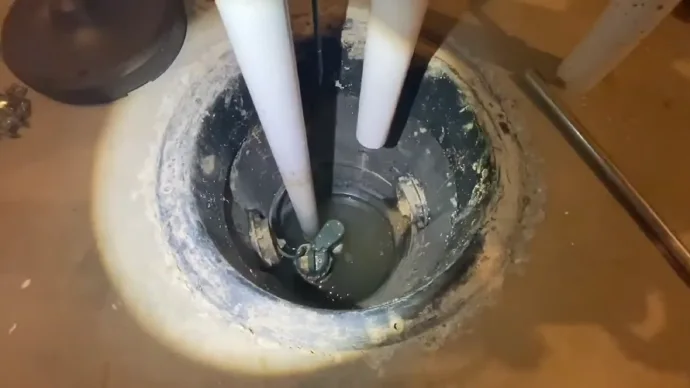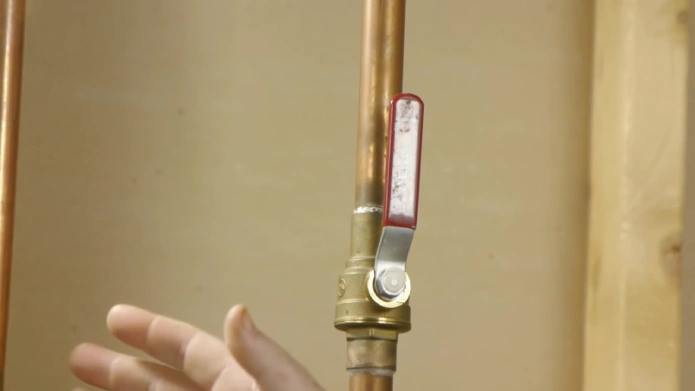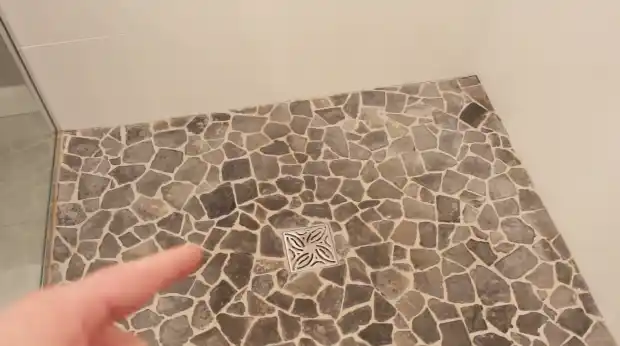Last Updated on July 16, 2023
Is your sump pump frequently running, but you’re not sure why? It’s possible that the culprit could be a water table issue. When groundwater levels are too close to the surface level near your home, it can cause constant operation of the sump pump. Fix this common cause and stop the inconvenient runs.
But, If your sump pump is still running and the water table has been reduced, it’s essential to check for other potential problems. Things like a jammed float switch staying in “on” mode, clogged or blocked discharge pipes, and more can all signal deeper issues within your system.
When your sump pump isn’t working correctly, don’t wait to get it fixed. Leaving it alone could damage its motor and leave you high and dry soon. This post has all the answers to why your sump pump keeps running and how best to stop it.
Why Does My Sump Pump Keep Running: Possible Reasons

Homeowners should pay close attention to their sump pumps, as these are vital tools for preventing basement flooding. However, without consistent maintenance and care, this essential device can easily become overwhelmed with groundwater, running day and night until it’s too late.
Some common reasons your sump pump might be overworking include:
The Float Switch Jammed In the On Position
Float switches are responsible for turning the sump pump on and off as needed. If the switch is stuck in an “on” position due to debris, loose wires, or other obstruction, it will keep running even when unnecessary.
This can lead to excessive wear and tear on the sump pump motor and cause it to fail prematurely. It is essential to check this switch regularly and remove any obstructions that could be causing it to remain stuck in an “on” position.
Clogged Inlet Screen
The inlet screen on a sump pump helps prevent dirt and debris from entering into the system. If it becomes clogged with sediment or other materials, it can restrict water flow through the pipe and cause the sump pump to keep running as it tries to force water through the blockage.
Regularly cleaning out these screens is essential for the optimum performance of your sump pump system.
High Water Table
A high water table refers to a situation where groundwater levels have risen above normal due to heavy rains or other natural events such as flooding. In this situation, more than the usual water enters your sump pit, requiring your pump to work constantly to keep up with demand.
High-capacity pumps may be necessary if you live in an area with frequently high water tables.
Blocked or Leaking Discharge Pipe
The discharge pipe of a sump pump is responsible for removing collected groundwater away from your home so that flooding does not occur. A blockage from debris or tree roots can prevent proper drainage, resulting in the constant running of your system.
Similarly, if there are any leaks present along this pipeline, then water may easily return back into your sump pit, causing continual operation of your system.
Check Valve Failure
Check valves are one-way valves that prevent water from flowing back into the sump pit. When they fail, they can cause an issue where water continuously flows back into the sump pit, leading to the pump running continuously to expel it.
If you suspect a check valve failure, it’s essential to contact a professional who can repair or replace the part as soon as possible.
In our recent review of the best check valves for sump pumps, we’ve analyzed several features that make each product stand out. Our review focused on the effectiveness of their construction, how well they can handle pressure, and how easy they are to install.
We looked at key performance indicators such as flow rate, maximum pressure differential, and material corrosion resistance. The following check valves for sump pumps all offer reliable performance in a variety of conditions, maximizing your return on investment.
Broken Impeller
The impeller of a sump pump looks like a fan, which spins to draw in water from the sump pit and push it out through the discharge pipe. If the impeller is broken or clogged, then the motor will run, but the impeller won’t spin and water won’t enter or exit the pump.
This will result in your pump constantly running until it’s fixed. This can be a tricky sump pump repair, so calling a professional for assistance is important.
Pump Too Small For the Job
A common mistake made when installing a sump pump is using one that is not powerful enough for its purpose. When your foundation gets a lot of rainwater and your pump isn’t powerful enough to expel it fast enough, it will constantly run to try to keep up.
Getting a sump pump with enough power and capacity for the job is important. Otherwise, you’ll be dealing with a constantly running pump.
Is there a risk associated with a sump pump that keeps running?

When a sump pump runs and won’t stop, it can create some serious issues that shouldn’t be taken lightly. Without regular maintenance or attention to the problem, you may end up with costly repairs.
Here are some of the potential risks:
Burnout of the Pump Motor: When a sump pump runs for long periods at a time, it puts added strain on the motor and increases its chances of burning out or becoming damaged. This can lead to costly repairs or replacements and put your home at a higher risk of flooding due to a lack of proper drainage.
Wasted Energy: Constant operation increases energy consumption, increasing utility bills and atmospheric emissions. This can also strain the pump motor, as it is working harder than necessary.
Increased Risk of Basement Flooding: If the sump pump’s motor fails due to burnout or other damage, it will be unable to keep your basement dry from incoming water. Keeping it broken down increases the chances that your basement will flood, which can cause extensive damage to your house.
Failure to Remove Water From the Sump Pit: As stated above, if a sump pump keeps running, then this indicates that it isn’t draining water away quickly enough. This could leave standing pools in the pit after each cycle is done. Basement humidity can go up because of this.
In turn, this can lead to the following:
- Odors
- Condensation on walls,
- Staining on ceilings and floors,
- Musty smells
Reduced Lifespan of Sump Pump: Just like any other machine with moving parts that are subject to repetitive use over prolonged periods without proper maintenance. The pumps will wear out prematurely if they’re not repaired or serviced before they stop working if they’re continuously running.
Tips for Maintaining a Sump Pump to Prevent Keeps Running

Constant running of your sump pump can lead to expensive repair bills and an ultimately shorter life. To avoid these issues, here is how you can keep your system performing at its peak level:
Inspect the Sump Pump Regularly
It’s important to inspect it at least once a year or more frequently, depending on its use. Ensure that the intake grate is clear of debris, the discharge line is free of clogs and all electrical connections are tight and secure.
If any issues are found during the inspection, they should be addressed quickly to avoid future problems.
Test the Sump Pump Regularly
The best way to ensure your sump pump is working correctly is to test it regularly. Place a cup or bucket of water into the sump pump pit and watch for the float switch to engage, which will then turn on the motor and start pumping out the accumulated water.
If the motor does not turn on or pumps slowly, you may need to call a professional for service or repair.
Keep Track of Power Outages
A power outage can cause your sump pump to fail due to a lack of electricity being supplied to it from the outlet. It’s vital that you keep track of any power outages in your area so that you can get your sump pump back up and running when power resumes.
You may also want to consider investing in a battery backup system in case of extended power outages lasting several hours or more.
Replace Seals As Needed
Over time, seals can become worn down due mainly from wear-and-tear and regular usage, which will lead to them needing replacement eventually. Regularly check seals for cracks, bulges, leaks, or hardening, and replace them with quality parts from reliable suppliers when necessary.
Clean Inside Components Regularly
Dirt build-up inside components can lead the motor to run inefficiently, causing decreased performance levels if not properly managed. Particularly if those components are submerged in unfiltered water like those found inside sump pits.
To maintain performance levels over time, you should clean these components regularly using mild detergents or degreasers. When dealing with electrical components, you should always follow the manufacturer’s instructions carefully.
When Does a Sump Pump Need to Run Too Much?

A sump pump should only be used when necessary and should not run too often. When the water level rises to a certain point, the sump pump should be triggered to start running automatically. Its operation frequency depends on several factors, such as the local climate conditions, the soil type, and the water table in your area.
In wet climates with a high water table, the sump pump may need to run 2-3 times daily due to excess groundwater. Flooding can occur more quickly in areas with clay soil or low-lying ground and require more frequent sump pump use.
Proper maintenance is essential to avoid constantly running your sump pump in a wet climate. Regular inspections, testing and cleaning will help keep it functioning optimally, so you don’t have to worry about the frequent operation or needless power expenditure.
What’s the Maximum Continuous Run Time of a Sump Pump?
A sump pump is designed to quickly and effectively remove excess water from a home or basement. Several factors affect them running continuously, including rainfall intensity, pump capacity, and any blockages in the system.
Generally, most sump pumps can run for 6-24 hours at a time without interruption.
The intensity of the rainfall plays a very important role in determining how long a sump pump can run continuously. During particularly heavy rainstorms, quick-acting pumps need to be able to keep up with the increased water flow, resulting in shorter periods of operation.
In contrast, during mild weather with lighter rainfall rates, pumps may be able to work for longer stretches without needing to be switched off.
Other than how much rain falls at any given time, another thing affecting its ability to run nonstop is its horsepower rating and gallons per hour rating. The higher these ratings are, the better job your sump pump will do in an emergency.
High-capacity pumps may be able to run for many hours without stopping as they’re better equipped to handle an increased water load than those with lower ratings.
In any case, any existing blockage inside your drain pipe, like sediment buildup, could also slow down your sump’s performance rate and make it less efficient. Follow the above tips and be sure to inspect your sump pump regularly.
Doing so will ensure that it will run smoothly for as long as possible and provide your home with the protection it needs.
Do Sump Pumps Run Continuously During Heavy Rain?

After an intense rain event, sump pumps are typically designed to run for up to 3 days to filter out all the excess groundwater. But given heavy rains, they could keep running even longer – talk about going above and beyond.
During this time, the pump will cycle on and off to keep the area around it dry. If a sump pump continues to run beyond this period, a clog or blockage may prevent proper draining.
If this is the case, it’s best to check drainage or contact a professional plumber to ensure water isn’t pooling near your foundation. Aside from that, during extreme weather events like storms and floods, sump pumps may have to work overtime and can’t handle the water flow.
In these cases, it’s essential to make sure your sump pump is well-maintained and in proper working condition before heavy rainfall occurs so that you can prevent flooding and water damage inside your home.
Check Your Sump Pump: Prevent It From Running Continuously
Having a sump pump that runs continuously can be an annoying and potentially costly problem for homeowners. Understanding the various potential causes behind this issue can give you an idea of what steps you need to take next to fix it.
High water tables usually cause continuous sump pump operation. Still, float switches jammed in the on position, clogged inlet screens and blocked or leaking discharge pipes, as we mentioned before, can all be other potential culprits.
By thoroughly investigating each possibility, you will have peace of mind knowing that your property is safe from flooding or other damage due to an improperly functioning sump pump.



